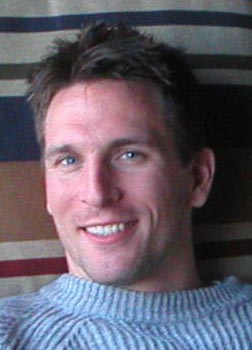Jan & Feb 2006: Germany
No place like home
What is it that makes us call home, our home? Is it simply the pace where we were born, where we were raised, were we spent the longest period of our lives or is it the place that gives us the strongest sense of belonging, feeling of safety or is it the close proximity to family and loved ones? I am sure each individual has their own definition as I sit and contemplate mine:
The car turns into “Landwehr” street, continues along its circular bend and my house comes into sight. Although I have not lived here in 10 years, warm feelings of belonging fill me and fond childhood memories surface. We park the car and walk through the garden toward the house, the same path which I have walked, run, or biked thousands of times. Although I have not been absent long the shape, layout, proportions and dimensions of the house and garden seem to change every time as I compare what lies in front of my eyes to the picture of my memory.
Three steps to the doorway and I am inside the house, my house. Although I have no physical possession in the house, it is still my house, not though ownership but via association of memories and feelings. I make my way up one flight of stairs and enter thought the first door on the right, my room. Few of the objects in the room still belong to me, but still a warm feeling, a welcoming embrace greets me. I AM HOME!
Impressions from Germany
What is it that defines the German culture, makes it unique, distinctly German?
It could be the German language, filled with logically structured and complex sentences, idioms, many dialects and regional differences. But there has to be more, much more.
The small size of the country entails a close proximity to almost everything. Shops in walking distance, public life occurring in the streets, bicycles sharing the road with cars, ubiquitous public transportation, trains leaving on time (showing little mercy to late arrivers) and arriving on time.
The rich history of Germany has undoubtedly shaped it people and is visible everywhere: thousand year old cities, many hundred year old buildings next to modern structures, two men sharing the subway bench in front of me, one reading Goethe’s Faust, the other jamming to techno music on his MP3 player while sipping a beer brewed by the ancient German Reinheitsgebot (Purity law). History is everywhere; in fact it is so abundant that it seems to blend into everyday life.
Then there are the clichés about Germany: castles along the Rhine River, the Oktoberfest, home of the one and only Autobahn filled with speeding BMWs and Mercedes, inventor of the printing press, Goethe, Kant, Einstein, Berlin and its former Wall, Carnival in Cologne or the beer garden culture of the long summer nights.
Then there are the more subtle things: Germans’ daily coffee and cake in the afternoon, the wine connoisseurs, the 4 way recycling on every corner and accordingly 4 different waste bags in every home, the German obsession with travel in search of sunshine and adventure or the strong German social system, which although having weakened still has to be one of the best in the world.
And what would Germany be without its strong virtues inherited from the Prussian empire that have allowed it rebuild itself from the ruins after World War II to a leading economic power in record time: orderliness, structure, punctuality, reliability and cleanliness. The strong political interest that the common population seems to share and along with that might come the (sometimes overly) critical view of the world. Germans like to complain (constantly pointing out things that can still be improved) but they also like the enjoy (may it be at the football stadium, carnival parade, sauna spa or at the beer garden).
Prost and cheers to Germany.



<< Home